|
|
|
Sort Order |
|
|
|
Items / Page
|
|
|
|
|
|
|
| Srl | Item |
| 1 |
ID:
174713
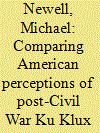

|
|
|
|
|
| Summary/Abstract |
Recently, public debates have questioned whether or not the American government responds differently to terrorism by white, right-wing, Americans. This article examines a historical period in which similar dynamics were on display in state responses to the Reconstruction-era Ku Klux Klan (KKK), Irish-American Fenians, and anarchists from 1860 to 1920. This history suggests that political officials responded to these groups more on the basis of ideas than their actual levels of violence, including discourses of Americanism shaped by ideology, nativism, and racism. Successful claims to ‘Americanism’ lent the KKK a sense of familiarity that led it to be seen as less of a threat to ontological security, even as it posed a significant threat of physical violence. In contrast, the ideologically subversive and foreign anarchists were responded to more severely, despite being responsible for far fewer deaths and injuries than the KKK. This history suggests that American counter-terrorism has been influenced by factors of racial and national belonging in the past, and provides significant context for the consideration of current debates about responses to right-wing groups.
|
|
|
|
|
|
|
|
|
|
|
|
|
|
|
|
| 2 |
ID:
141967
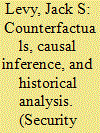

|
|
|
|
|
| Summary/Abstract |
I focus primarily on the utility of counterfactual analysis for helping to validate causal inferences in historical analysis. How can we use what did not happen but which easily could have happened to understand what did happen? With an infinite number of things that might have happened, and with temptations to construct “counterfactuals of convenience” to bolster one's preferred historical interpretations or political preferences, we need a set of rules or best practices for evaluating the scientific legitimacy of counterfactuals. Building on earlier work in several disciplines, I develop a set of criteria for the conduct of counterfactual analysis in historical case studies. The best counterfactuals begin with clearly specified plausible worlds involving small and easily imaginable changes from the real world. They make relatively short-term predictions based on empirically validated theoretical generalizations and on secondary counterfactuals that are mutually consistent. These counterfactuals are also sensitive to strategic behavior that might return history to its original course, and they are explicitly tested against competing counterfactuals.
|
|
|
|
|
|
|
|
|
|
|
|
|
|
|
|
| 3 |
ID:
166438
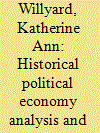

|
|
|
|
|
| Summary/Abstract |
Flaring (i.e., burning natural gas extracted at an oil or gas well) is an economically wasteful and environmental harmful industrial practice. Although initially banned in Texas, Texas Statewide Rule 32 currently allows oil wells to obtain a permit to legally flare gas. Through a thick description based on archival research, this paper explains: (1) how Texas flaring regulations emerged and weakened over time, (2) why Texas flaring regulations weakened, and (3) the implications of formal policy changes. This paper argues historical political-legal developments created new opportunities for companies to legitimately flare extracted natural gas. As new shale oil and gas development occurs in previously unreachable areas, incentives for immediate profits often outweigh the benefits of investing in the infrastructure and technology necessary to use extracted natural gas for productive purposes.
|
|
|
|
|
|
|
|
|
|
|
|
|
|
|
|
| 4 |
ID:
132935


|
|
|
|
|
| Publication |
2014.
|
| Summary/Abstract |
This article applies ethnographic methods and historical analysis to explore Jewish-Arab relations within Israeli freemasonry. This article tracks local Masonic history as the fraternity development from individual lodges under colonial like obedience's in late Ottoman and Mandate -era Palestine into a national level organization, under the ground lodge of the state of Israel. In light of an official position of political noninvolvement, Jewish and Arab-Palestine members conveyed shared value of universal fraternity, but variable interpretation of citizenship and nationalism.
|
|
|
|
|
|
|
|
|
|
|
|
|
|
|
|
| 5 |
ID:
132724
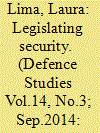

|
|
|
|
|
| Publication |
2014.
|
| Summary/Abstract |
This article examines the traditional conceptions of security and defence in Brazil. It does so by investigating their introduction in the political and legal vocabulary in Brazilian legislation. It further explores these terms as part of a project of militarization of the state and society which peaked during the Estado Novo dictatorship (1937-1945). Legislative sources and political writings of the time are thus used to corroborate the historical analysis and two main arguments: (1) conceptual innovations introduced in legislation allowed the armed forces to establish its monopoly over specific policy areas and, later, (2) to legally exercise control over civilian life. As such, it highlights the early relationship established between Brazilianess and development and argues that speaking security enabled authoritarian sectors to put forward their own project of development.
|
|
|
|
|
|
|
|
|
|
|
|
|
|
|
|
| 6 |
ID:
131323


|
|
|
|
|
| Publication |
2014.
|
| Summary/Abstract |
An age-old form of warfare, insurgency is still a problem for many governments today and merits careful study. Regional governments, global coalitions and international security policy-makers--all have an interest in finding the ways and means of countering such challenges. Historical analysis provides a good foundation for understanding the problem and seeking solutions to it. The Rand Corporation has undertaken an extensive and detailed comparative examination of insurgencies begun and completed worldwide since the Second World War, focusing on the 71 most recently resolved conflicts in particular. The findings of this important study provide useful guidelines for implementing an effective counter-insurgency strategy.
|
|
|
|
|
|
|
|
|
|
|
|
|
|
|
|
| 7 |
ID:
111287


|
|
|
|
|
| Publication |
2012.
|
| Summary/Abstract |
Most nation-states in Asia and Africa that gained independence from colonial rulers during the middle of the 20th century are diverse in their ethnic composition. The national governments make efforts to politically integrate their constituent units in the face of the continuing resistance of several ethnic groups. India adopted various means to integrate the more than 600 princely states and other loosely administered areas. Although the issue of integration has been largely settled in the mainland, various radical groups in the Northeastern region still question the extension of the Indian state. This article provides a historical analysis of the process of integration of the various states of Northeast India.
|
|
|
|
|
|
|
|
|
|
|
|
|
|
|
|
| 8 |
ID:
131325


|
|
|
|
|
| Publication |
2014.
|
| Summary/Abstract |
Since the end of the Cold War, the nature and purpose of the Western alliance, of which New Zealand has by long established tradition been a member, has undergone significant change; so, too, have New Zealand's commercial interests and trading patterns. New Zealand now faces significant costs from its continued membership of a military alliance no longer in perfect harmony with its commercial interests. With the conformity demands of the Western alliance and the country's best commercial interests diverging and soon, possibly, to be pulling in opposite directions, is it time for New Zealand to make a fundamental reappraisal of its positioning?
|
|
|
|
|
|
|
|
|
|
|
|
|
|
|
|
| 9 |
ID:
124273
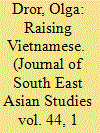

|
|
|
|
|
| Publication |
2013.
|
| Summary/Abstract |
This essay considers the importance of looking at writings for children for historical analysis, particularly in times of war, focusing on magazines published for youth in South Vietnam in the early 1970s. Two magazines, Thi?u Nhi and Th?ng B?m, in particular, are studied in terms of their editorial aims and contents, as well as their young readers' submissions in response to contemporary sociocultural issues raised in these magazines. The lively discussions in these magazines were made possible by the relative freedom of expression in South Vietnam, compared to North Vietnam, which was an important reason for the civil war being fought. Yet this freedom also challenged the fabric of Vietnamese society. The strongest concern of these magazines' initiators, editors and writers was that its readers not lose their sense of being Vietnamese in the face of the great wartime flood of American popular culture that captivated many youth. Anxiety that the younger generation would be Americanised and lose their identity struck at the core of what the war was being fought about: i.e. different versions of being Vietnamese in the modern world. This threat of Americanisation to fundamental Vietnamese values was perceived by some intellectuals in the South as more serious than the threat of communism, because at least the communists were Vietnamese.
|
|
|
|
|
|
|
|
|
|
|
|
|
|
|
|
| 10 |
ID:
089051
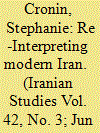

|
|
|
|
|
| Publication |
2009.
|
| Summary/Abstract |
For the nationalist elite of early Pahlavi Iran, the regime's military successes over tribal opposition, whether real or imagined, were welcomed and celebrated. These successes were interpreted as confirmation of their views of tribal power as hostile to modernity, archaic and outmoded, and of Riza Shah as the deliverer of Iran's national salvation. This conceptualization of the "tribal problem" had appeared in tandem with and as a product of modernist ideology in the late nineteenth century, acquired the backing of state power with the rise of the Pahlavi dynasty, and endured until the revolution of 1979. It communicated itself, in diluted form, to Western scholarship, which has been largely content to depict Riza Shah's tribal policies as regrettably brutal, but an unavoidable stage in Iran's progress and "modernization."
Yet this version of tribe-state relations is clearly an ideological construct rather than an historical analysis. The account which follows begins a re-evaluation of tribal politics in modern Iran, focusing especially on the Riza Shah decades when these politics were a site of intense conflict and where the nationalist template was most starkly delineated, and concludes by tracing and re-examining the evolution of the tribe-state dynamic in the decades of land reform and revolution.
|
|
|
|
|
|
|
|
|
|
|
|
|
|
|
|
| 11 |
ID:
133786
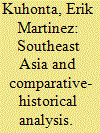

|
|
|
|
|
| Publication |
2014.
|
| Summary/Abstract |
This article seeks to assess the contributions and key characteristics of comparative-historical analysis in the field of Southeast Asian studies. It does so by examining three specific issues that emerge from this methodological genre: the conceptualization of the region of Southeast Asia, the role of theory, and the emphasis on macro structural ontology. These issues are analyzed in three disciplines: political science, history, and anthropology. The article shows that dialogue among comparative-historical researchers is most evident within the disciplines of political science and history. In anthropology, important comparative-historical work has also been produced but it has been less engaged within the comparative-historical canon. In reviewing these three disciplines' shared analytical concerns as well as contributions to comparative-historical analysis, the article makes an implicit case for greater interdisciplinary engagement across the disciplines.
|
|
|
|
|
|
|
|
|
|
|
|
|
|
|
|
| 12 |
ID:
115884


|
|
|
|
|
| Publication |
2012.
|
| Summary/Abstract |
The article is an attempt to study the history of the Tedim Road, a 265 km transborder road connecting Imphal (the capital of Manipur in India) with Tedim in the Chin Hills (Chin State) in western Burma (Myanmar). It was constructed by the British solely for the purpose of facilitating military movements along the India-Burma frontier during the Second World War. Although it is yet to receive adequate scholarly attention, the historical significance of the Tedim Road as part of the larger Allied plan for the reconquest of Burma after it was lost to the Japanese in the early 1940s cannot be overlooked. The article attempts to analyse encounters between the Allied and the Japanese on this road. It argues that the historical events that occurred on the Tedim Road and the participation of the indigenous tribes of the India-Burma frontier in the war made a significant contribution to ensuring the withdrawal of the Japanese from the Indian frontier.
|
|
|
|
|
|
|
|
|
|
|
|
|
|
|
|
| 13 |
ID:
124538
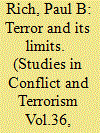

|
|
|
|
|
| Publication |
2013.
|
| Summary/Abstract |
This article argues that much of the historical analysis of terror and terrorism in history has been weak in understanding the limits on terrorist activity and how terrorist campaigns eventually end. Reviewing three recent studies that examine various aspects of terrorism and the language of terror, the article seeks to show that states often play a major role in the way terrorist movements develop and eventually end up either defeated or moving into mainstream political engagement. The article points to a number of examples to illuminate this including the Carbonara in nineteenth century Italy, the Paris Commune and the ending segregation in the U.S. South in the 1960s.
|
|
|
|
|
|
|
|
|
|
|
|
|
|
|
|
| 14 |
ID:
128528


|
|
|
|
|
| Publication |
2013.
|
| Summary/Abstract |
The year 2011 marked the tenth anniversary of the implementation of Indonesia's regional autonomy laws. This paper considers implications of more than a decade of decentralized governance for urban development in Indonesia. After a brief historical overview and consideration of the rationale for political and administrative decentralization issue image_86_4_Bunnellin that national context, we examine a range of critical perspectives on policy outcomes. Both media coverage and academic analyses have overwhelmingly cast decentralized governance as it has been implemented in Indonesia in a negative light. As a corrective to this, we have sought to identify positive outcomes and possibilities associated with Indonesia's large-scale decentralization project. In particular, we detail the cases of two cities which have been cast in a variety of rankings and media representations as success stories of urban development through decentralized governance: Solo (or Surakarta as the city is also formally named) and Surabaya. In the final section of the paper, we critically evaluate these two cases and discuss their wider implications.
|
|
|
|
|
|
|
|
|
|
|
|
|
|
|
|
|
|
|
|
|